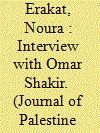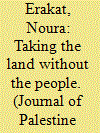| Srl | Item |
| 1 |
ID:
174261


|
|
|
|
|
| Summary/Abstract |
In late November 2019, the Israeli Supreme Court upheld the Ministry of Interior's order to deport Human Rights Watch (HRW) director for Israel and Palestine, Omar Shakir. The court based its decision on a 2017 amendment to Israel's 1952 Entry into Israel Law enabling the government to refuse entry to foreigners who allegedly advocate for the boycott of Israel. The same law was invoked to deny entry to U.S. congresswomen Rashida Tlaib and Ilhan Omar in the summer of 2019. The campaign against Shakir began almost immediately after he was hired by HRW in 2016, and the court's decision marked the culmination of a multi-year battle against the deportation order. In this interview, JPS Editorial Committee member, Rutgers University professor, and author Noura Erakat discusses the details of his case with Shakir in an exchange that also examines the implications of the case for human rights advocacy, in general, and for Palestinians, in particular. The interview was edited for length and clarity.
|
|
|
|
|
|
|
|
|
|
|
|
|
|
|
|
| 2 |
ID:
178338


|
|
|
|
|
| Summary/Abstract |
This essay examines JPS’s fifty-year archive of law-related content from the prism of its contribution to the author’s own thinking (and writing) about the relationship between law and politics in the context of the Palestinian question. Noura Erakat identifies as a “greatest hit” Hanna Dib Nakkara’s “Israeli Land Seizure under Various Defense and Emergency Regulations” (1985) for its meticulous documentation of the Israeli legal regime established to confiscate Palestinian lands. Erakat’s “hidden gem” is “Juridical Characteristics of Palestinian Resistance: An Appraisal in Law,” coauthored by W. T. Jr. and S. V. Mallison. Published in 1973, the article argues for the treatment of captured fedayeen as prisoners of war four years prior to the amendment of the Geneva Convention recognizing national liberation struggles as international conflicts.
|
|
|
|
|
|
|
|
|
|
|
|
|
|
|
|
| 3 |
ID:
155907


|
|
|
|
|
| Summary/Abstract |
This paper seeks to show how Israel has deployed Occupation Law in strategic ways to incrementally take the land of Palestine without its people. It argues that Israel has used UN Security Council Resolution 242 to retroactively legitimate those colonial takings in a political framework shaped by U.S. intervention. In themselves, the constituent pieces of the argument are not new and they have been extensively discussed in legal, political science, and historical literature. Rather than consider them as the sum of their parts, this paper attempts to view the issues that have been kept distinct and separate within disciplinary silos as a mutually-reinforcing whole, demonstrating that the United States’ political position made an otherwise bankrupt legal argument effective and showing how the Security Council’s deliberations gave Israel ample room for maneuver in spite of the drafting parties’ original intent. In examining the relationship between law and political power, the article points to the ways in which the balance of power bears upon the meaning and significance of law in international conflict. Thus, the failure of Occupation Law to regulate the occupation of the Palestinian Territories ultimately reflects the outcome of a political, not a legal, contest: Israel’s legal argumentation that the territories are merely under its administration would have no value were it not for the power politics that shape international relations in the region.
|
|
|
|
|
|
|
|
|
|
|
|
|
|
|
|